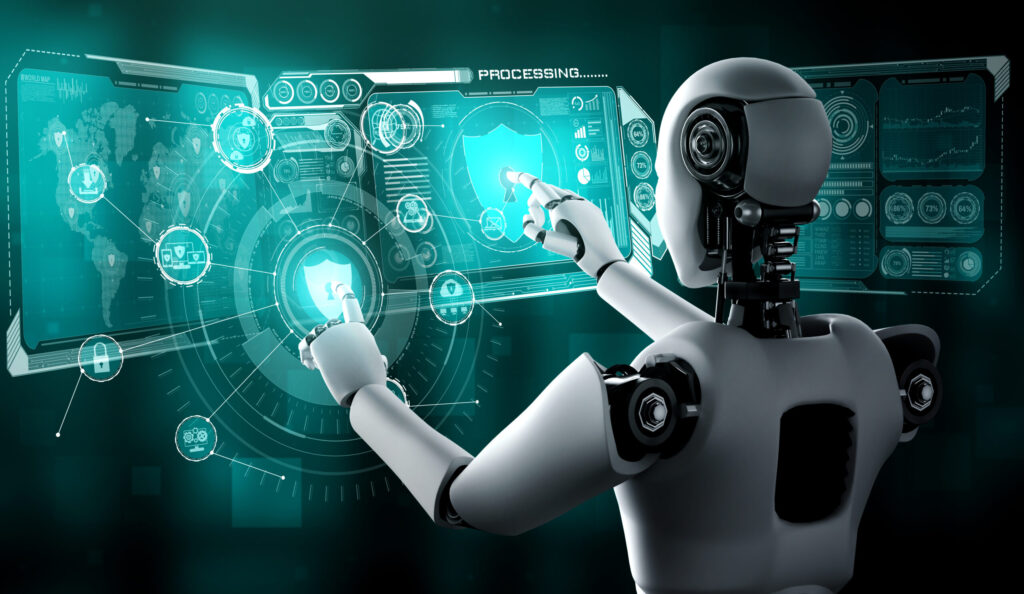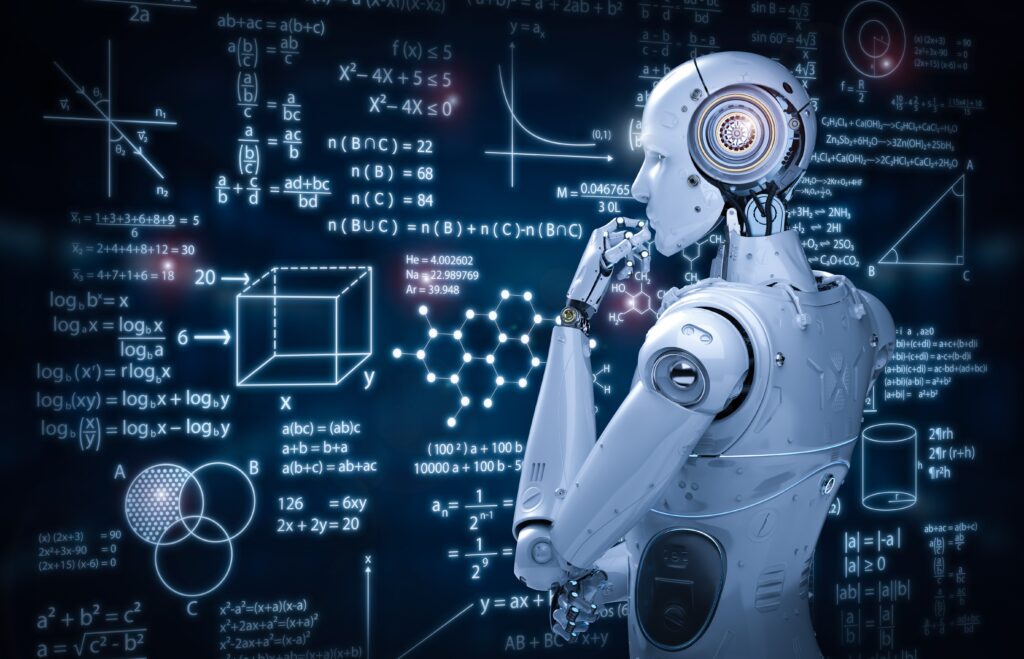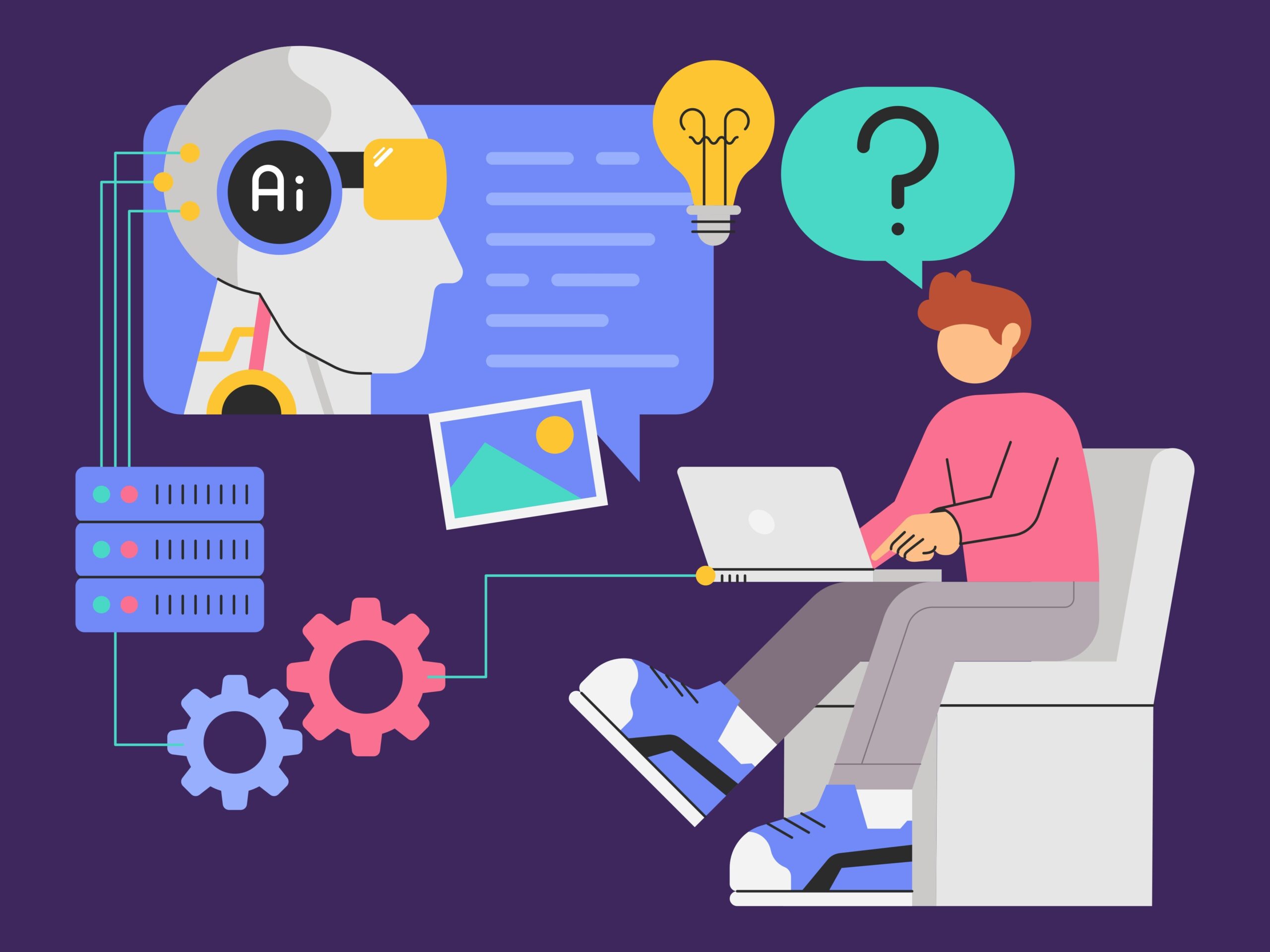Future of Ai is evolving at an unprecedented pace, shaping industries, economies, and everyday life. Over the next decade, AI is expected to become more powerful, intelligent, and integrated into our world. From automation and ethical concerns to breakthroughs in machine learning and human-AI collaboration, the future of AI holds exciting possibilities.
In this article, we’ll explore the key trends, advancements, and challenges we can expect in the coming years.
1. AI-Powered Automation Will Transform Industries
Artificial Intelligence (AI)-driven automation is set to revolutionize industries by optimizing processes, increasing efficiency, and reducing costs. As businesses continue to integrate AI-powered solutions, we can expect significant advancements in multiple sectors.
How AI is Driving Automation
AI-powered automation leverages machine learning, natural language processing (NLP), and robotics to handle repetitive tasks, make data-driven decisions, and enhance operational efficiency. Here’s how different industries will evolve with AI-driven automation:
Manufacturing and Supply Chain Optimization
- Smart Factories: AI-powered robotic arms, predictive maintenance, and IoT-enabled sensors will enable factories to operate with minimal human intervention.
- Automated Quality Control: AI-powered computer vision systems will detect defects in products with higher accuracy than human inspectors.
- Supply Chain Forecasting: AI-driven analytics will predict demand, manage inventory, and optimize logistics in real time, reducing waste and improving efficiency.
Healthcare: AI-Powered Diagnosis & Patient Care
- AI-Driven Medical Imaging: AI algorithms will analyze medical scans (X-rays, MRIs, CT scans) more accurately than traditional methods, helping doctors detect diseases like cancer in their early stages.
- Automated Administrative Tasks: AI chatbots and virtual assistants will handle appointment scheduling, medical billing, and patient queries, freeing up healthcare professionals for critical care.
- Robot-Assisted Surgeries: AI-powered surgical robots will enhance precision, reducing the risk of human error in complex procedures.
Finance and Banking: Fraud Detection & Personalized Services
- Automated Fraud Detection: AI will detect suspicious transactions in real time, preventing fraudulent activities and enhancing security.
- Personalized Financial Advice: AI-driven chatbots and robo-advisors will analyze user data to offer customized investment and financial planning advice.
- Algorithmic Trading: AI-powered trading bots will execute trades faster and more efficiently, making stock market investments more accessible.
Retail and E-commerce: AI-Enhanced Customer Experience
- AI-Powered Recommendation Systems: E-commerce platforms will use AI to analyze user preferences and suggest personalized product recommendations.
- Automated Inventory Management: AI-driven forecasting will optimize stock levels, reducing waste and increasing efficiency.
- Cashier-less Stores: AI-powered checkout systems (like Amazon Go) will eliminate the need for human cashiers, speeding up the shopping process.
Customer Service and HR: AI-Powered Virtual Assistants
- AI Chatbots for Customer Support: Companies will use AI-powered chatbots to handle inquiries, complaints, and troubleshooting in real-time.
- AI in Recruitment: AI-driven HR platforms will screen resumes, assess candidates, and schedule interviews automatically, making hiring processes more efficient.
The Future of AI-Powered Automation
While AI-driven automation will replace some repetitive jobs, it will also create new opportunities in AI system maintenance, programming, and oversight. The key challenge will be ensuring a smooth transition for workers through upskilling and job reallocation.

2. The Growth of Generative AI
Generative AI, a subset of artificial intelligence that can create text, images, videos, music, and even code, is rapidly evolving. Over the next decade, this technology will dramatically reshape content creation, entertainment, and even human-AI collaboration.
What is Generative AI?
Generative Future of AI refers to AI models that generate new data based on patterns learned from existing data. Some of the most well-known models include:
- GPT (ChatGPT, Bard, etc.) – Generates human-like text.
- DALL·E, MidJourney, Stable Diffusion – Creates realistic images and artwork from text prompts.
- DeepMind’s AlphaCode – Generates code and assists in software development.
- MusicLM and Jukebox – AI models that create original music compositions.
How Generative Future of AI is Transforming Industries
1. Content Creation and Marketing
- Automated Writing and Editing: AI-powered tools will assist in writing blog posts, news articles, and even novels with minimal human input.
- AI-Powered Video Production: AI will generate realistic videos, movie scripts, and even AI-generated actors for films and advertisements.
- Enhanced Graphic Design: Designers will use AI tools to generate creative visuals, logos, and branding materials faster.
2. Entertainment and Gaming
- AI-Generated Virtual Characters: AI will create lifelike characters with unique personalities for video games and films.
- AI in Scriptwriting: AI will assist in drafting movie scripts, TV show dialogues, and interactive storytelling experiences.
- Procedural Content Generation in Gaming: AI will dynamically create game environments, quests, and non-playable characters (NPCs) based on user interactions.
3. Healthcare and Drug Discovery
- AI-Generated Molecular Structures: AI models will create new drug compounds, speeding up the process of developing new medicines.
- AI in Mental Health Support: Generative AI chatbots will offer personalized mental health advice and emotional support.
- AI-Enhanced Medical Documentation: AI will help doctors generate medical reports and patient summaries more efficiently.
4. Software Development and Coding
- AI-Assisted Coding: Tools like GitHub Copilot and DeepMind’s AlphaCode will help programmers write and debug code faster.
- Automated Code Generation: Future of AI will create software applications from simple user descriptions, making programming more accessible.
- AI-Powered Cybersecurity: Future of AI models will generate and test security protocols to prevent cyberattacks.
5. Education and Learning
- AI-Powered Tutors: Future of AI will provide personalized lessons, explanations, and feedback for students.
- AI in E-Learning: AI will create interactive courses, quizzes, and study materials tailored to individual learning styles.
- AI-Generated Research Summaries: AI will summarize academic papers, making research more accessible for students and professionals.
Challenges and Ethical Concerns in Generative AI
While generative AI presents incredible opportunities, it also raises ethical challenges:
- Misinformation & Deepfakes: AI-generated fake news and realistic deepfake videos can spread misinformation.
- Bias in AI Models: AI systems trained on biased data may reinforce stereotypes and discrimination.
- Copyright and Intellectual Property Issues: The legal ownership of AI-generated content remains a gray area.
The Future of AI
In the next decade, generative AI will become more sophisticated, enhancing human creativity rather than replacing it. Businesses, educators, and content creators will leverage AI to generate innovative solutions, while policymakers will work to regulate its ethical use.

3. AI and Healthcare: Breakthroughs in Diagnosis and Treatment
Healthcare will be one of the most impacted sectors by AI advancements. Key developments include:
- AI-powered drug discovery: Machine learning will speed up drug development and testing.
- Personalized medicine: AI will analyze patient data to offer tailored treatments.
- Enhanced medical imaging: AI will improve early disease detection through better image analysis.
4. Ethical AI: Addressing Bias and Fairness
As AI becomes more integrated into society, ethical concerns will grow. Key challenges include:
- Bias in AI algorithms: Efforts will be made to eliminate discrimination in AI decision-making.
- Transparency and accountability: Governments and organizations will push for explainable AI models.
- Privacy protection: AI systems will need to balance innovation with user data security.
5. The Future of AI in Education
AI will reshape education through:
- AI-powered tutors: Personalized learning assistants will help students grasp concepts more effectively.
- Automated grading and assessments: AI will reduce workload for educators and provide real-time feedback.
- Virtual reality (VR) and AI integration: Immersive AI-driven learning experiences will become more common.
6. AI in Smart Cities and Everyday Life
In the coming decade, AI will enhance urban living with:
- Smart traffic management: AI will optimize traffic flow and reduce congestion.
- AI-driven energy efficiency: Cities will use AI to optimize energy consumption.
- Advanced voice assistants: AI will seamlessly integrate with homes and offices, providing real-time assistance.
7. The Evolution of AI-Powered Security
With cyber threats increasing, AI will play a key role in cybersecurity by:
- AI-driven threat detection: Machine learning will identify and prevent cyberattacks in real-time.
- Enhanced biometric security: Facial recognition and fingerprint scanning will become more sophisticated.
- Fraud prevention in finance: AI will detect and prevent fraudulent activities in banking.
8. Human-AI Collaboration: The Next Frontier
The future isn’t about AI replacing humans but working alongside them. In the next decade, we can expect:
- AI-augmented workforce: Employees will use AI tools to enhance decision-making and efficiency.
- Advanced natural language processing (NLP): AI will better understand and interact with humans.
- Ethical AI guidelines: Organizations will establish regulations for responsible AI usage
FAQs About the Future of AI
1. How will AI-powered automation impact jobs in the next decade?
AI-powered automation will streamline repetitive tasks, making businesses more efficient. While some jobs may be replaced, new opportunities in AI maintenance, oversight, and development will emerge. The key challenge will be upskilling workers to adapt to new AI-driven roles.
2. What industries will benefit the most from AI automation?
Industries that rely on repetitive processes and data analysis will benefit the most. This includes:
- Manufacturing: AI-driven robotics and predictive maintenance.
- Healthcare: AI-assisted diagnostics, robotic surgeries, and personalized treatments.
- Finance: AI-driven fraud detection, automated trading, and robo-advisors.
- Retail and E-commerce: AI-powered chatbots, personalized recommendations, and smart inventory management.
3. What is generative AI, and how does it work?
Generative AI is a subset of artificial intelligence that creates text, images, videos, music, and even code by learning patterns from existing data. Popular examples include:
- ChatGPT (Text Generation) – Writes articles, scripts, and even conversations.
- DALL·E & MidJourney (Image Generation) – Creates AI-generated art based on text descriptions.
- GitHub Copilot (Code Generation) – Helps developers write and debug code.
4. How will generative AI impact content creation?
Generative AI will enhance creativity rather than replace humans by:
- Automating repetitive writing tasks.
- Generating high-quality images and videos.
- Assisting in scriptwriting, marketing campaigns, and personalized content.
5. What are the ethical concerns related to AI?
AI raises several ethical issues, including:
- Bias in AI Models: AI can reinforce stereotypes if trained on biased data.
- Misinformation & Deepfakes: AI-generated content can spread false information.
- Job Displacement: Automation could lead to job losses in certain industries.
- Privacy Risks: AI-driven data collection raises concerns about personal security.
6. Will AI replace human workers completely?
No, AI is designed to augment human capabilities, not replace them. While AI will automate certain tasks, humans will still be needed for decision-making, creativity, and ethical oversight. The focus will shift toward collaboration between AI and human workers.
7. How will AI impact healthcare in the future?
AI will revolutionize healthcare through:
- AI-driven medical imaging: Faster and more accurate disease detection.
- Personalized medicine: AI will analyze patient data to suggest tailored treatments.
- AI-assisted surgeries: Robotic systems will improve precision and reduce risks.
- Drug discovery: AI will accelerate the development of new medicines.
8. What role will AI play in cybersecurity?
AI will enhance cybersecurity by:
- Detecting cyber threats in real time.
- Preventing fraud and identity theft.
- Strengthening biometric security (e.g., facial recognition, fingerprint scanning).
- Automating threat response to cyberattacks.
9. How will AI improve education in the next decade?
AI will make education more personalized and efficient by:
- AI-powered tutors: Providing individualized learning experiences.
- Automated grading: Reducing workload for teachers.
- Virtual and augmented reality integration: Making learning more immersive.
10. Will AI become sentient in the next decade?
Currently, AI operates on narrow intelligence, meaning it can perform specific tasks but does not possess emotions, self-awareness, or general intelligence like humans. While AI will become more advanced and intuitive, true sentient AI (Artificial General Intelligence – AGI) is still a long way off and remains a topic of speculation.
Conclusion
The next decade will be a transformative period for AI. From revolutionizing industries and healthcare to ethical challenges and human-AI collaboration, AI will continue to reshape the world. While concerns about bias, privacy, and job displacement remain, responsible AI development can lead to a future where technology enhances human potential rather than replacing it.
As we step into this AI-driven future, embracing innovation while ensuring ethical considerations will be key to maximizing AI’s benefits for society. get in touch with us today!











